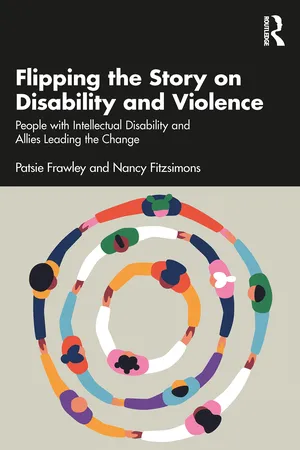
Flipping the Story on Disability and Violence
People with Intellectual Disability and Allies Leading the Change
- English
- ePUB (mobile friendly)
- Available on iOS & Android
Flipping the Story on Disability and Violence
People with Intellectual Disability and Allies Leading the Change
About this book
Internationally there is a growing awareness that domestic, family, and sexual violence is a social issue that results from social structures and relational contexts that have positioned women as 'less than' men. Alongside this growing awareness has come social action by women and their allies that aim to change these social and relational structures using an intersectional framing of oppression.
People with disabilities, especially people with an intellectual disability, have been largely excluded from this social action. However, for decades they have been challenging the oppressive social and relational structures that frame them as 'of less value' than 'non-disabled' people. Aligned with this self-advocacy are social ecological models that look systemically to understand why interpersonal violence occurs and to prevent violence. This book introduces a unique 'flipped' social ecological model and applies it to approaches from across the world that are working from the societal, community, relationship, and individual levels to challenge the 'vulnerable victim' discourse through positioning people with intellectual and other disabilities as social change agents shaping their safer lives.
Divided into six chapters and providing case-examples from Australia, the United States, New Zealand, the United Kingdom, Norway, Sweden, and the Global South, this book profiles work done by government and community-based anti-violence service sectors in partnership with people with intellectual disability and their allies, as well as work on sexuality rights and disability advocacy that is contributing to the social effort to prevent interpersonal violence against people with an intellectual disability.
It is a must-read resource for anyone doing interpersonal violence prevention research and work and can be used as primary or supplemental reading for students doing coursework and research in disability studies, gender studies, community psychology, sociology, public health, and social work.
Frequently asked questions
- Essential is ideal for learners and professionals who enjoy exploring a wide range of subjects. Access the Essential Library with 800,000+ trusted titles and best-sellers across business, personal growth, and the humanities. Includes unlimited reading time and Standard Read Aloud voice.
- Complete: Perfect for advanced learners and researchers needing full, unrestricted access. Unlock 1.4M+ books across hundreds of subjects, including academic and specialized titles. The Complete Plan also includes advanced features like Premium Read Aloud and Research Assistant.
Please note we cannot support devices running on iOS 13 and Android 7 or earlier. Learn more about using the app.
Information
Table of contents
- Cover
- Half-Title Page
- Title Page
- Copyright Page
- Table of Contents
- List of Figures
- List of Tables
- Foreword
- Preface
- Acknowledgments
- About the Authors
- 1 Disability and Interpersonal Violence Prevention: A Flipped Social Ecological Approach
- 2 The Society Level: Societal Change – Rights, Opportunities, Equity, and Disability Justice
- 3 The Community Level: It Takes a Community – Reimagining Community and Strengthening Community Connections
- 4 Relationship Level: Family, Friends, Trusted Supporters – Relational and Relationship-Based Violence Prevention
- 5 The Individual Level: People with an Intellectual Disability Leading the Change
- 6 Creating a Global Space for Sustaining Prevention of Violence ‘by’ and ‘with’ People with Disabilities
- Index